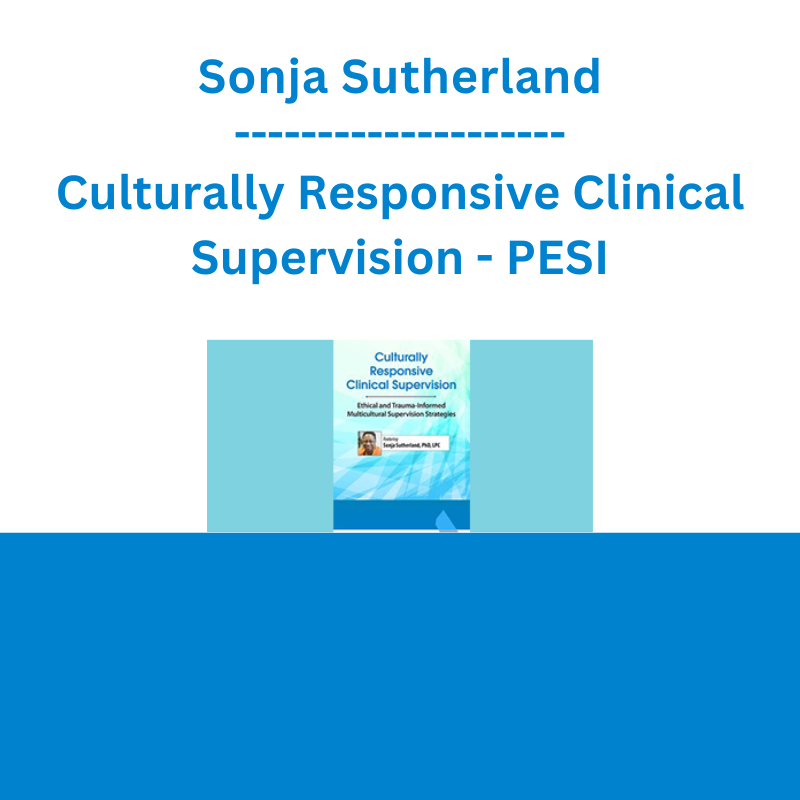*** Proof of Product ***
Exploring the Essential Features of “Sonja Sutherland – Culturally Responsive Clinical Supervision: Ethical and Trauma-Informed Multicultural Supervision Strategies – PESI”
Speaker: Sonja Sutherland, PhD, LPC
Format: Audio and Video
Media Type: Digital Seminar
Description
As a supervisor, I struggled with knowing how to teach my supervisees how to be culturally competent.
My students knew all of the multicultural theories and models, but they weren’t engaging with clients effectively.
Then I discovered a how to make my supervision method antiracist – by teaching and modeling key ways to broach the topics of race and racial trauma… showing supervisees how to utilize the dynamic interaction of difference within supervision sessions… and demonstrating how to integrate multicultural theory into a cohesive intervention approach.
Join me in my advanced supervision workshop and I’ll share this essential information with you. We’ll go beyond the basics together, and you’ll get:
- Tools for teaching supervisees how to therapeutically discuss race, culture, power, privilege, oppression, and intersectionality
- A roadmap for ethical, culturally-rooted and trauma-informed case conceptualization
- Guidance for delivering social justice-drive intervention and advocacy
Don’t miss this opportunity to become a culturally responsive supervisor!
Register today!
Sonja Sutherland, PhD, LPC
Speaker
Sonja Sutherland, PhD, LPCRelated seminars and products
Sonja Sutherland, PhD, LPC, trains clinicians and supervisors in the development of cross-cultural responsivity. Renowned in the field, she has provided individual, group, and family therapeutic services in many different settings for adolescents and adults for 20 years. Within the last 6 years, Dr. Sutherland has provided training, researched, and published in the areas of racial trauma, cultural competence development, the provision of culturally responsive clinical intervention and supervision, and social justice advocacy. Dr. Sutherland’s primary clinical practice centers on providing clinical supervision services to post-masters clinicians pursuing licensure.
Dr. Sutherland has served as a guest lecturer, trainer, and presenter for various organizations including Kaiser, ESPYR, Telehealth Institute, the Georgia Psychological Association and many others. Dr. Sutherland is a core faculty member at Walden University as well as the founder and CEO of Legacy Changers Worldwide, an organization dedicated to providing family education and mental and emotional wellness resources. In addition, Dr. Sutherland provides continuing education workshops and supervision for various organizations, as well as being the Chief Diversity Consultant to the President for Richmont Graduate University. She is also a member of the American Counseling Association (ACA), the Association for Multicultural Counseling & Development (AMCD), the Association of Counselor Educators and Supervisors (ACES), and the Licensed Professional Counselor Association of Georgia (LPCA-GA).
Speaker Disclosures:
Financial: Dr. Sonja Sutherland has employment relationships with Walden University, Richmont Graduate University, Legacy Changers Worldwide, and Legacy Professional Development & Training, LLC. She receives a speaking honorarium from PESI, Inc. She has no relevant financial relationships with ineligible organizations.
Non-financial: Dr. Sonja Sutherland is a member of the American Counseling Association, the Association for Counselor Educators and Supervisors, and the Association for Multicultural Development.
Objectives
- Analyze the impact of cultural humility and self-and-other awareness on rapport building and intervention success in supervisory relationships.
- Develop steps for clearly approaching antiracist, culturally-rooted, and trauma-informed case conceptualization in supervision.
- Apply understanding of worldview and racial identity to ethical supervisee development and clinical case conceptualization.
- Determine key factors in fostering ethical, culturally humble, and clinically helpful conversations around race and diversity in supervision.
- Integrate the developmental language and focus needed for personal and supervisee cultural competence assessment and development.
- Apply professional codes of ethics in the area of multicultural competence and supervision.
- Utilize case conceptualization guides to enhance intervention effectiveness in multicultural supervision.
Outline
- Privilege, Marginalization, and Intersectionality
Discuss privilege, marginalization and intersectionality
Supervisor/supervisee differences and the impact on the supervision relationship
Encourage self-awareness and accountability in supervisees
Increase supervisor self-awareness and development of antiracist supervision
Tools for assessing barriers to cultural competence - Broaching Race and Racial Trauma with Supervisees
Microaggressions and race-based trauma
Health ramifications of race-based and secondary traumatic stress
Racial battle fatigue – causes and stress reactions
Racial socialization and impact on clinical and supervisory practice
Ask clients directly about discrimination, racial stress, and racial trauma
Translate distinct multicultural models into a cohesive approach to intervention
Therapeutic missteps in incorrectly assessing, conceptualizing, and contextualizing contributors to supervisee worldview
Clarify importance of intersectionality in supervisors, supervisees, and client case conceptualization
Understand socio-political context when assessing the presentations of supervisees and their clients
Understand and utilize the dynamic interaction of difference within supervision and counseling relationships
Teach supervisees the use of client case conceptualization guide for assessing key diversity-related contributors to client presentation - Theoretical Model of Cross-Cultural Civility & Intelligence Mindset Development
4-stage theoretical model of cross-cultural civility, intelligence, and competence development
Racial and cultural identity development
Cultural humility
Multicultural & social justice considerations
Transtheoretical stages of change
Inter-and-intrapersonal civility mindset development
The personal and professional processes of being-in-becoming - Supervisor Ethics and Responsibilities
Train future clinicians with best practices in cultural competence
Eliminate bias in assessment and treatment
Develop cultural sensitivity through personal value awareness
Identify supervisor positionality to race and ethnicity - Case Studies
Explore 3 separate case studies featuring supervisees and clients of differing or opposing backgrounds
Discussion of four supervisor case examples in varying stages of development with discussion on components of personalized professional development plans related to cultural competence
2021 interviews with early-career clinicians discussing perspectives on what is needed from a supervisor related to cultural competence
Target Audience
- Social Workers
- Counselors
- Psychologists
- Psychotherapists
- Addiction Counselors
- Marriage & Family Therapists
- Psychiatric Nurses
- Psychiatrists
- Physicians
- Other Mental Health Professionals
Please see the full list of alternative group-buy courses available here: https://lunacourse.com/shop/










 Dave Landry - Stock Selection Course
Dave Landry - Stock Selection Course  The Daily Traders – Exclusive Trading Mentorship Group
The Daily Traders – Exclusive Trading Mentorship Group